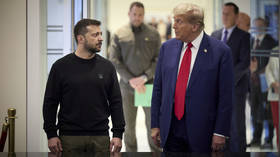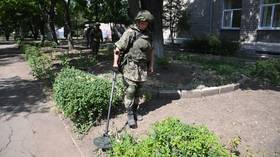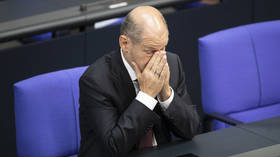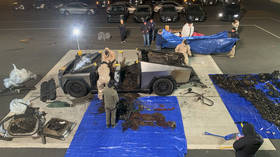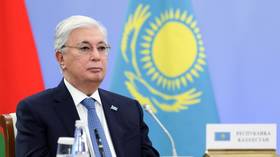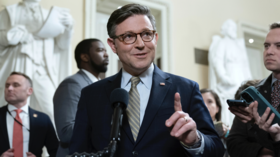A ‘position of strength’ for the West and Ukraine doesn’t exist anymore
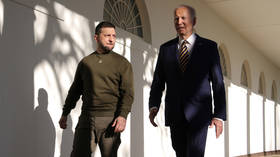
“To negotiate from a position of strength” is a favorite cliché of the West. And understandably so, as that short phrase is quite handy: It serves to cover up the opposite of a genuine negotiation, namely vulgar blackmail and crude imposition of fait-accompli terms, backed up by force and threats of force.
The expansion of NATO after the end of the Cold War, for instance, was handled in that manner: “Oh, but we are willing to talk,” the West kept saying to Russia, “and, meanwhile, we will do exactly as we please, and your objections, interests, and security be damned.”
This approach seemed to “work” – very much for want of a better term – as long as Russia was weakened by the unusually deep political, economic, social, military, and, indeed, spiritual crisis that accompanied the end of the Soviet Union and outlasted it for roughly a decade.
When, finally, Moscow tried to put the West on notice that Russia had recovered sufficiently to demand a healthier style of interaction, Western media informed their publics only in a biased and superficial manner. And Western elites reacted with irritation, while also failing to at least take seriously what irritated them. That is what happened, for instance, after Russian President Vladimir Putin’s now famous speech at the Munich Security Conference in 2007. Yes, that long ago already.
In other words, Western elites obstinately kept insisting on believing in their own rhetoric, even while it was quickly losing whatever tenuous link to reality it had, for a short moment that was historically anomalous. While Russia’s (and not only Russia’s) “strength” was clearly increasing and that of the West decreasing, non-”negotiating” by force and fait accompli remained a Western addiction. That, obviously, is a large part of the very sad story of how Ukraine was turned into rubble.
Which brings us to the present. At this point, it takes clinical-grade delusion not to notice that “strength” is on Moscow’s side in the war in and over Ukraine. Russian troops are “advancing at the fastest rate” since early 2022, the gung-ho, pro-NATO British Telegraph admits. Ukraine’s forces remain over-aged, over-matched, over-burdened, and stretched thin. Units designed to hold a 5-kilometer line are frequently assigned to 10 or 15 kilometers. Russia has clear, even crushing superiority in artillery and sheer manpower as well: ordinary soldiers, NCOs, and officers – all are scarce on the Ukrainian side. Ukraine’s predictably wasteful August incursion into the Kursk Region of Russia, meanwhile, faces an intense Russian counterattack that, as the Wall Street Journal admits coyly, “appears to be working.” Russia’s pressure in an air war waged with various missiles and drones is relentless.
Unsurprisingly, the mood of Ukraine’s population is reflecting these difficulties. The Economist – only slightly more refined than the Telegraph in its stoutly Russophobic bellicosity – reports Gallup polls showing that a majority of Ukrainians want negotiations to end the war. Within a year, their share has risen from 27% to 52%, while those claiming that they would prefer to go on to the bitter end (misnaming that option as “victory”) has declined from 63% to 38%. If those false “friends of Ukraine,” who apparently believe friendship consists in burning up your buddies in a proxy war, were serious about their once so fashionable rhetoric about Ukrainians’ “agency,” they would now be helping the Ukrainians to make peace by concessions.
All the more as Ukrainian pollsters confirm the Gallup data, according to Ukrainian semi-dissident news site Strana.ua. They found that almost two thirds of Ukrainians (64%) are ready for “freezing” the war along the current front lines, that is by giving up on all territories under de facto Russian control. Well over half (56%) think that “victory” should not be defined as retaking all territories within Ukraine’s 1991 borders. Meaning they, too, explicitly disagree with the long-held, if now perhaps quietly eroding, official position of the Zelensky regime and are prepared to concede territory for peace. And while reading such poll figures, always keep in mind that Ukraine is now a de facto authoritarian, media-streamlined, and oppressive country where voicing doubt takes special courage – or despair.
And then, there is Trump. Despite his campaign promises to rapidly shut down the proxy war, it remains impossible to predict what exactly president-elect Donald Trump will do once he is inaugurated in January. It would be imprudent to simply assume that he will force the Zelensky regime into a peace Moscow can agree to. Trump has chosen retired General Keith Kellogg as his special envoy for Ukraine. Kellogg, at this stage, represents the ambiguity of the Trumpist approach: He is the co-author of a think-tank paper published before the elections under the title “America First, Russia, & Ukraine.” While its policy proposals provide more reasons to worry for Kiev than Moscow, the paper also displays unrealistic assumptions, such as that Russia can still be coerced by threats of further escalation or will settle for a mere postponing – instead of complete elimination – of Ukraine’s NATO perspective.
Russian Foreign Minister Sergey Lavrov, for one, has just articulated a certain skepticism, declaring that a settlement is still far off, in essence, because the West is not yet ready to face reality. This, again, is all the more likely as Moscow insists not only on territorial changes but also real neutrality for Ukraine, taking NATO membership – whether official or by stealth – off the table forever.
And yet, there can be no doubt that from Kiev’s perspective, Trump and at least part of his team look and very well could be dangerous. Not, really, for Ukraine and ordinary Ukrainians, who need this initially avoidable war to end, but for the Zelensky regime and the often corrupt, war-profiteering elites tied to it. In addition, reports are emerging that Trump’s team is also considering opening direct contact with North Korea’s leader Kim Jong-un. That as well could be a sign that Trump’s inauguration may really be followed by a political turn against continuing the proxy war, insofar as claims that North Korean combat troops have entered the war on Russia’s side have served to justify the Western escalation of helping Ukraine fire Western missiles into Russia.
In short, the West and Ukraine’s Zelensky regime are on the back foot, militarily, geopolitically, and in terms of popular support inside Ukraine as well. And what is their reaction? This is where there’s another perverse twist as only Western elites can come up with: With its proxy war project of using Ukraine to inflict a strategic defeat on Russia in tatters, instead of signaling a willingness to change course, the West – whether sincerely or as a bluff – is outdoing itself in militant rhetoric and some serious escalatory action, too.
In Washington, the outgoing Biden administration’s decision not simply to permit but to assist in the launching of Western missiles into Russia is only the tip of the iceberg. Crushingly defeated in the elections and clearly without a real mandate, the Democrats are doing everything they can to heap up more combustible material between the West and Russia: Moscow is facing yet more sanctions affecting its banking and energy sector, the delivery of US land mines to Ukraine, and Washington’s official lifting of restrictions on US mercenaries getting active in Ukraine (not that that makes much of a real-life difference; they are, of course, already there). US secretary of state Antony Blinken has been explicit that the aim is to release a maximum amount of aid before Trump comes into office with the intention – unrealistic yet destructive – of making Ukraine fit to fight next year.
In Europe, the UK has already rapidly followed the US lead – as is its wont – and also helped Ukraine fire missiles into Russia. With France, things seem a little murkier in that regard, but that may only be due to Paris preferring to do things a little more quietly. In any case, London and Paris have come together, if in a haphazard way, in once again publicly toying with the harebrained notion of bringing Western ground forces – including officially, not black-ops/mercenary style as of now – into the war. The ideas reported are vague and contradictory, it is true: the spectrum of potential deployment seems to reach from sending NATO-Europeans – for instance, French, British, or Polish troops – to die on the frontlines in a direct clash with a battle-hardened, well-equipped, and highly motivated Russian army to much more modest schemes, involving stationing them in what will be left of Ukraine after the fighting ends.
It is also unclear whether the reports of such plans – if that is the word – first surfacing in the French newspaper Le Monde are to be taken seriously at all. We may be looking at another hapless attempt to produce “strategic ambiguity,” i.e. to try to impress Moscow with things Moscow knows the West cannot really do. If so, the West can’t even keep up a poker face: British Foreign Secretary David Lammy has already come out to reassure the British public that his country will not send ground troops. Even tiny Estonia felt a need to chime in: Its defense minister Hanno Pevkur has publicly argued against sending ground troops, too. Instead, he suggested, the West should ramp up its financial and military-industrial support for Ukraine.
And that, it seems, may be where things are really going. Or, at least, where the West’s most stubborn bellicists want to take them. In the case of the UK and France as well, not all discussions have focused on troops. Instead, the military enterprises DCI (in France) and Babcock (in Britain) are a key part of the debates. In addition, there are, of course, ongoing training efforts. The UK has by now pre-processed over 40,000 Ukrainian troops for the proxy war meat grinder. France is setting up a whole brigade.
It is a wide-open question if European NATO members, economically squeezed and soon to be at least semi-abandoned by the US, will be able to afford such a strategy. Most likely, not. And yet, what matters for now are elite illusions that it could. Trying alone will be extremely destructive, for the people of Europe as well as of Ukraine.
If I were Ukrainian, I would look at all of this with dread, because if that is the NATO-European approach to keeping the war going – boosting equipment and training – then it, of course, means that even more Ukrainians will have to be mobilized and sacrificed. Indeed, the Biden desperados have just put fresh pressure on Kiev to lower the conscription age to 18 and sacrifice even more Ukrainians in a lost war. Their prospects are grim, and by now, they are openly told so, by no one less than Ukraine’s former commander-in-chief. Speaking to Ukrainian troops training in Britain, Valery Zaluzhny has just stressed that dying is their most likely fate. The West and its Ukrainian servants have reached the “Banzai!” charge stage of the war. But then, Zaluzhny also believes that World War Three has already started. So, nothing to lose, it seems.
Yet here is the final irony of this bleak picture: In the US, Joe Biden is the lamest of ducks, discredited in every way conceivable, including his de facto participation in Israel’s Gaza genocide. Emmanuel Macron in France must be the least popular president since the Fifth Republic started in the late 1950s, kept in office by constitutional mis-design and manipulation; Britain’s Keir Starmer has alienated his people to such an extent that an unprecedented de facto plebiscite is on its way to get rid of him. It won’t be able to actually push him out, but it certainly signals the depth of the public’s contempt. And Valery Zaluzhny, from Ukraine, but currently a misfit of an ambassador in London? He may actually have quite a future in Ukrainian politics, which is precisely why he was exiled to Britain. But for now, he, too, is a marginalized, sometimes slightly comical figure.
Acting “from a position of strength”? It is striking: Not only is the West in general no longer in that position. The most belligerent figures in the West now often are the ones with the weakest popular mandates at home. Compensatory behavior? A desperate attempt to distract from or to overcome that weakness? Sheer arrogance reaching delusional loss-of-reality level? Who knows? What is certain is that as long as the West is under this kind of management, Lavrov will be right and peace will remain remote.
The statements, views and opinions expressed in this column are solely those of the author and do not necessarily represent those of RT.

